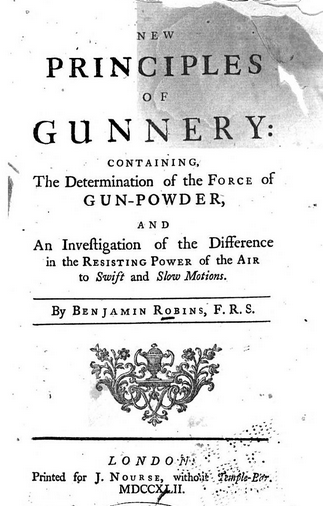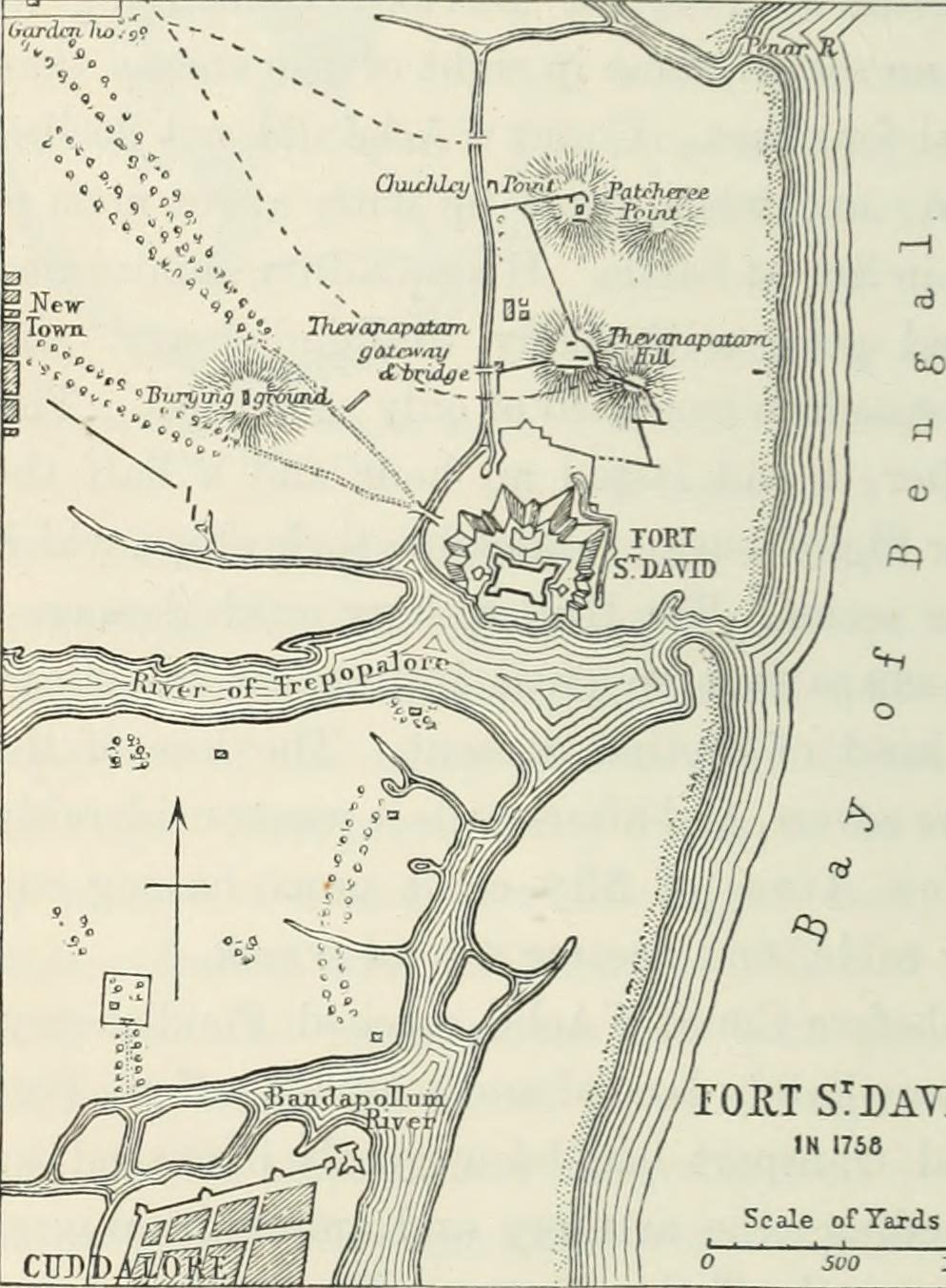|
Benjamin Robins
Benjamin Robins (170729 July 1751) was a pioneering British scientist, Newtonian mathematician, and military engineer. He wrote an influential treatise on gunnery, for the first time introducing Newtonian science to military men, was an early enthusiast for rifled gun barrels, and his work had substantive influence on the development of artillery during the latter half of the eighteenth century – and directly stimulated the teaching of calculus in military academies. Early life Benjamin Robins was born in Bath. His parents were Quakers in poor circumstances, and as a result, he received very little formal education. Having come to London on the advice of Dr. Henry Pemberton (1694–1771), who had recognised Robins's talents, for a time he maintained himself by teaching mathematics, but soon devoted himself to engineering and the study of fortification. Scientific gunnery In particular he carried out an extensive series of experiments in gunnery, embodying his results in hi ... [...More Info...] [...Related Items...] OR: [Wikipedia] [Google] [Baidu] |
Mathematics
Mathematics is an area of knowledge that includes the topics of numbers, formulas and related structures, shapes and the spaces in which they are contained, and quantities and their changes. These topics are represented in modern mathematics with the major subdisciplines of number theory, algebra, geometry, and analysis, respectively. There is no general consensus among mathematicians about a common definition for their academic discipline. Most mathematical activity involves the discovery of properties of abstract objects and the use of pure reason to prove them. These objects consist of either abstractions from nature orin modern mathematicsentities that are stipulated to have certain properties, called axioms. A ''proof'' consists of a succession of applications of deductive rules to already established results. These results include previously proved theorems, axioms, andin case of abstraction from naturesome basic properties that are considered true starting poin ... [...More Info...] [...Related Items...] OR: [Wikipedia] [Google] [Baidu] |
British House Of Commons
The House of Commons is the lower house of the Parliament of the United Kingdom. Like the upper house, the House of Lords, it meets in the Palace of Westminster in London, England. The House of Commons is an elected body consisting of 650 members known as members of Parliament (MPs). MPs are elected to represent constituencies by the first-past-the-post system and hold their seats until Parliament is dissolved. The House of Commons of England started to evolve in the 13th and 14th centuries. In 1707 it became the House of Commons of Great Britain after the political union with Scotland, and from 1800 it also became the House of Commons for Ireland after the political union of Great Britain and Ireland. In 1922, the body became the House of Commons of the United Kingdom of Great Britain and Northern Ireland after the independence of the Irish Free State. Under the Parliament Acts 1911 and 1949, the Lords' power to reject legislation was reduced to a delaying power. T ... [...More Info...] [...Related Items...] OR: [Wikipedia] [Google] [Baidu] |
Fellows Of The Royal Society
Fellowship of the Royal Society (FRS, ForMemRS and HonFRS) is an award granted by the judges of the Royal Society of London to individuals who have made a "substantial contribution to the improvement of natural knowledge, including mathematics, engineering science, and medical science". Fellowship of the Society, the oldest known scientific academy in continuous existence, is a significant honour. It has been awarded to many eminent scientists throughout history, including Isaac Newton (1672), Michael Faraday (1824), Charles Darwin (1839), Ernest Rutherford (1903), Srinivasa Ramanujan (1918), Albert Einstein (1921), Paul Dirac (1930), Winston Churchill (1941), Subrahmanyan Chandrasekhar (1944), Dorothy Hodgkin (1947), Alan Turing (1951), Lise Meitner (1955) and Francis Crick (1959). More recently, fellowship has been awarded to Stephen Hawking (1974), David Attenborough (1983), Tim Hunt (1991), Elizabeth Blackburn (1992), Tim Berners-Lee (2001), Venki Ramakris ... [...More Info...] [...Related Items...] OR: [Wikipedia] [Google] [Baidu] |
18th-century English Mathematicians
The 18th century lasted from January 1, 1701 ( MDCCI) to December 31, 1800 ( MDCCC). During the 18th century, elements of Enlightenment thinking culminated in the American, French, and Haitian Revolutions. During the century, slave trading and human trafficking expanded across the shores of the Atlantic, while declining in Russia, China, and Korea. Revolutions began to challenge the legitimacy of monarchical and aristocratic power structures, including the structures and beliefs that supported slavery. The Industrial Revolution began during mid-century, leading to radical changes in human society and the environment. Western historians have occasionally defined the 18th century otherwise for the purposes of their work. For example, the "short" 18th century may be defined as 1715–1789, denoting the period of time between the death of Louis XIV of France and the start of the French Revolution, with an emphasis on directly interconnected events. To historians who expand ... [...More Info...] [...Related Items...] OR: [Wikipedia] [Google] [Baidu] |
Ballistics Experts
Ballistics is the field of mechanics concerned with the launching, flight behaviour and impact effects of projectiles, especially ranged weapon munitions such as bullets, unguided bombs, rockets or the like; the science or art of designing and accelerating projectiles so as to achieve a desired performance. A ballistic body is a free-moving body with momentum which can be subject to forces such as the forces exerted by pressurized gases from a gun barrel or a propelling nozzle, normal force by rifling, and gravity and air drag during flight. A ballistic missile is a missile that is missile guidance, guided only during the relatively brief initial phase of powered flight and the trajectory is subsequently governed by the laws of classical mechanics; in contrast to (for example) a cruise missile which is aerodynamics, aerodynamically guided in powered flight like a fixed-wing aircraft. History and prehistory The earliest known ballistic projectiles were stones and spears, and ... [...More Info...] [...Related Items...] OR: [Wikipedia] [Google] [Baidu] |
English Engineers
English usually refers to: * English language * English people English may also refer to: Peoples, culture, and language * ''English'', an adjective for something of, from, or related to England ** English national identity, an identity and common culture ** English language in England, a variant of the English language spoken in England * English languages (other) * English studies, the study of English language and literature * ''English'', an Amish term for non-Amish, regardless of ethnicity Individuals * English (surname), a list of notable people with the surname ''English'' * People with the given name ** English McConnell (1882–1928), Irish footballer ** English Fisher (1928–2011), American boxing coach ** English Gardner (b. 1992), American track and field sprinter Places United States * English, Indiana, a town * English, Kentucky, an unincorporated community * English, Brazoria County, Texas, an unincorporated community ... [...More Info...] [...Related Items...] OR: [Wikipedia] [Google] [Baidu] |
People From Bath, Somerset
A person ( : people) is a being that has certain capacities or attributes such as reason, morality, consciousness or self-consciousness, and being a part of a culturally established form of social relations such as kinship, ownership of property, or legal responsibility. The defining features of personhood and, consequently, what makes a person count as a person, differ widely among cultures and contexts. In addition to the question of personhood, of what makes a being count as a person to begin with, there are further questions about personal identity and self: both about what makes any particular person that particular person instead of another, and about what makes a person at one time the same person as they were or will be at another time despite any intervening changes. The plural form "people" is often used to refer to an entire nation or ethnic group (as in "a people"), and this was the original meaning of the word; it subsequently acquired its use as a plural form o ... [...More Info...] [...Related Items...] OR: [Wikipedia] [Google] [Baidu] |
1751 Deaths
In Britain and its colonies (except Scotland), 1751 only had 282 days due to the British Calendar Act of 1751, which ended the year on 31 December (rather than nearly three months later according to its previous rule). Events January–March * January 1 – As the American colony in Georgia (U.S. state), Georgia prepares the transition from a Trustee Georgia, trustee-operated territory to a Province of Georgia, British colonial province, the prohibition against slavery is lifted by the Trustees for the Establishment of the Colony of Georgia in America, Board of Trustees. At the time, the African-American population of Georgia is about 400 people who have been kept as slaves in violation of the law. By 1790, the slave population increases to over 29,000 and by 1860 to 462,000. * January 7 – The University of Pennsylvania, conceived 12 years earlier by Benjamin Franklin and its other trustees to provide non-denominational higher education "to train young pe ... [...More Info...] [...Related Items...] OR: [Wikipedia] [Google] [Baidu] |
1707 Births
Seventeen or 17 may refer to: * 17 (number), the natural number following 16 and preceding 18 * one of the years 17 BC, AD 17, 1917, 2017 Literature Magazines * ''Seventeen'' (American magazine), an American magazine * ''Seventeen'' (Japanese magazine), a Japanese magazine Novels * ''Seventeen'' (Tarkington novel), a 1916 novel by Booth Tarkington *''Seventeen'' (''Sebuntiin''), a 1961 novel by Kenzaburō Ōe * ''Seventeen'' (Serafin novel), a 2004 novel by Shan Serafin Stage and screen Film * ''Seventeen'' (1916 film), an American silent comedy film *''Number Seventeen'', a 1932 film directed by Alfred Hitchcock * ''Seventeen'' (1940 film), an American comedy film *'' Eric Soya's '17''' (Danish: ''Sytten''), a 1965 Danish comedy film * ''Seventeen'' (1985 film), a documentary film * ''17 Again'' (film), a 2009 film whose working title was ''17'' * ''Seventeen'' (2019 film), a Spanish drama film Television * ''Seventeen'' (TV drama), a 1994 UK dramatic short starring Chr ... [...More Info...] [...Related Items...] OR: [Wikipedia] [Google] [Baidu] |
Fort St David
Fort St David, now in ruins, was a British fort near the town of Cuddalore, a hundred miles south of Chennai on the Coromandel Coast of India. It is located near silver beach without any maintenance. It was named for the patron saint of Wales because the governor of Madras at the time, Elihu Yale, was Welsh. History Fort St David, situated on the mouth of River Gadilam, has a memorable history. The region was under the domains of the Nayaks of Gingee. The Dutch in early 17th century wishing to expand their trade in the Bay of Bengal region and take advantage of the local manufacturing of goods choose the Cuddalore region and sought the permission of Krishnappa Nayaka of Gingee, to build a fort at Devanampatnam which was, subsequently granted in 1608 and construction was started. But the Nayak pulled back after the Portuguese, then dominant players at the Coramandal Coast trade, pressured Gingee's overlord rulers, Venkata I of Vijayanagara Empire to prevent Dutch entry. There ... [...More Info...] [...Related Items...] OR: [Wikipedia] [Google] [Baidu] |
Fort
A fortification is a military construction or building designed for the defense of territories in warfare, and is also used to establish rule in a region during peacetime. The term is derived from Latin ''fortis'' ("strong") and ''facere'' ("to make"). From very early history to modern times, defensive walls have often been necessary for cities to survive in an ever-changing world of invasion and conquest. Some settlements in the Indus Valley civilization were the first small cities to be fortified. In ancient Greece, large stone walls had been built in Mycenaean Greece, such as the ancient site of Mycenae (famous for the huge stone blocks of its ' cyclopean' walls). A Greek '' phrourion'' was a fortified collection of buildings used as a military garrison, and is the equivalent of the Roman castellum or English fortress. These constructions mainly served the purpose of a watch tower, to guard certain roads, passes, and borders. Though smaller than a real fortress, the ... [...More Info...] [...Related Items...] OR: [Wikipedia] [Google] [Baidu] |





_1938.jpg)


